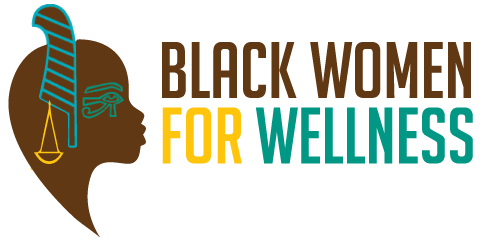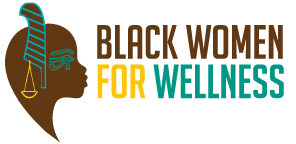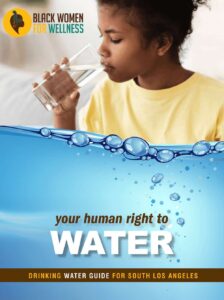FOR IMMEDIATE RELEASE
(Los Angeles, CA / April 1, 2024) – Black Women for Wellness’ Environmental Justice team has released a comprehensive water guide aimed at addressing water equity in South Los Angeles.
The Drinking Water Guide for South Los Angeles is a resource to give residents the information they deserve about their water, and is part of our push to ensure access to clean, affordable, and safe drinking water for all.
Water is hugely important – over 50 percent of the human body is made up of water, and water is closely linked to our health. However, two thirds of Black families recently surveyed by BWW indicated that they do not trust the quality of their tap water.
Black Women for Wellness (BWW) is committed to the health and well-being of Black women and girls through health education, empowerment and advocacy. Water equity is an Environmental Justice issue because communities of color are more likely to experience contaminated water and access issues. Water equity is also a Reproductive Justice issue because clean water is crucial for fertility, to sustain healthy pregnancies, and to raise children in healthy conditions.
The guide is divided into two main sections to provide residents with a holistic understanding of the water challenges facing South Los Angeles:
Section 1: Understanding the Issues
A high-level overview of the national and local systems that impede water equity, shedding a light on the intersection between reproductive justice and water, as well as the profound impact of climate change on water systems.
Section 2: Taking Action
Practical resources and steps residents can take to address their water concerns. From information on low-income assistance programs in Los Angeles to guidance on choosing water filters for homes, this section equips individuals with the tools they need to advocate for their right to clean water.
BWW encourages residents to utilize this guide as a resource and take proactive steps toward securing their access to safe and affordable drinking water.
Key Findings from “A Drinking Water Guide for South Los Angeles”
The report highlights the multifaceted challenges facing South Los Angeles residents regarding water access, affordability, and quality. Key findings include:
Imported Water
There are over 200 water utility providers across LA, and there are 57 in South LA alone. And almost two thirds of LA’s water is imported – this is very expensive, has severe climate implications, and threatens the quality of our drinking water
Human Right to Water
California was the first state to recognize that there is a human right to water – however, between our warming climate, environmental racism, and poor investment in water infrastructure, there is much to be done to actualize your right to water.
Health Implications
Clean water is essential for good health, particularly for vulnerable populations such as pregnant individuals and young children. With over 50 percent of the human body composed of water, access to clean drinking water is crucial for overall well-being.
Environmental Justice Concerns
Black households across the country are disproportionately affected by polluted drinking water, with a staggering 75 percent more likely to live near facilities producing hazardous waste.
Bottled Water Misconceptions
Contrary to popular belief, bottled water is not a viable alternative to tap water. Plastic bottles can contain over 150 chemicals that may leach into the water, and a significant portion of bottled water is simply tap water sold at a higher price, .
For more in-depth analysis and resources, please refer to “A Drinking Water Guide for South Los Angeles” available on the Black Women for Wellness website. Click here to read the full guide.
About Black Women for Wellness:
Founded in 1997, Black Women for Wellness is a California-based nonprofit organization committed to the health and well-being of Black women and girls. Through education, advocacy, and leadership development, the organization seeks to empower communities and create lasting change in reproductive health, rights, and justice.
The Environmental Justice program works to build healthier communities by addressing issues caused and perpetuated by environmental racism. We work on issues such as the elimination of oil drilling, the reduction of harms associated with plastic pollution, the exposure of toxic chemicals in our personal and hair care products, and more.
For media inquiries, please contact:
Myeisha Essex
Communications Manager
Black Women for Wellness
[email protected]


